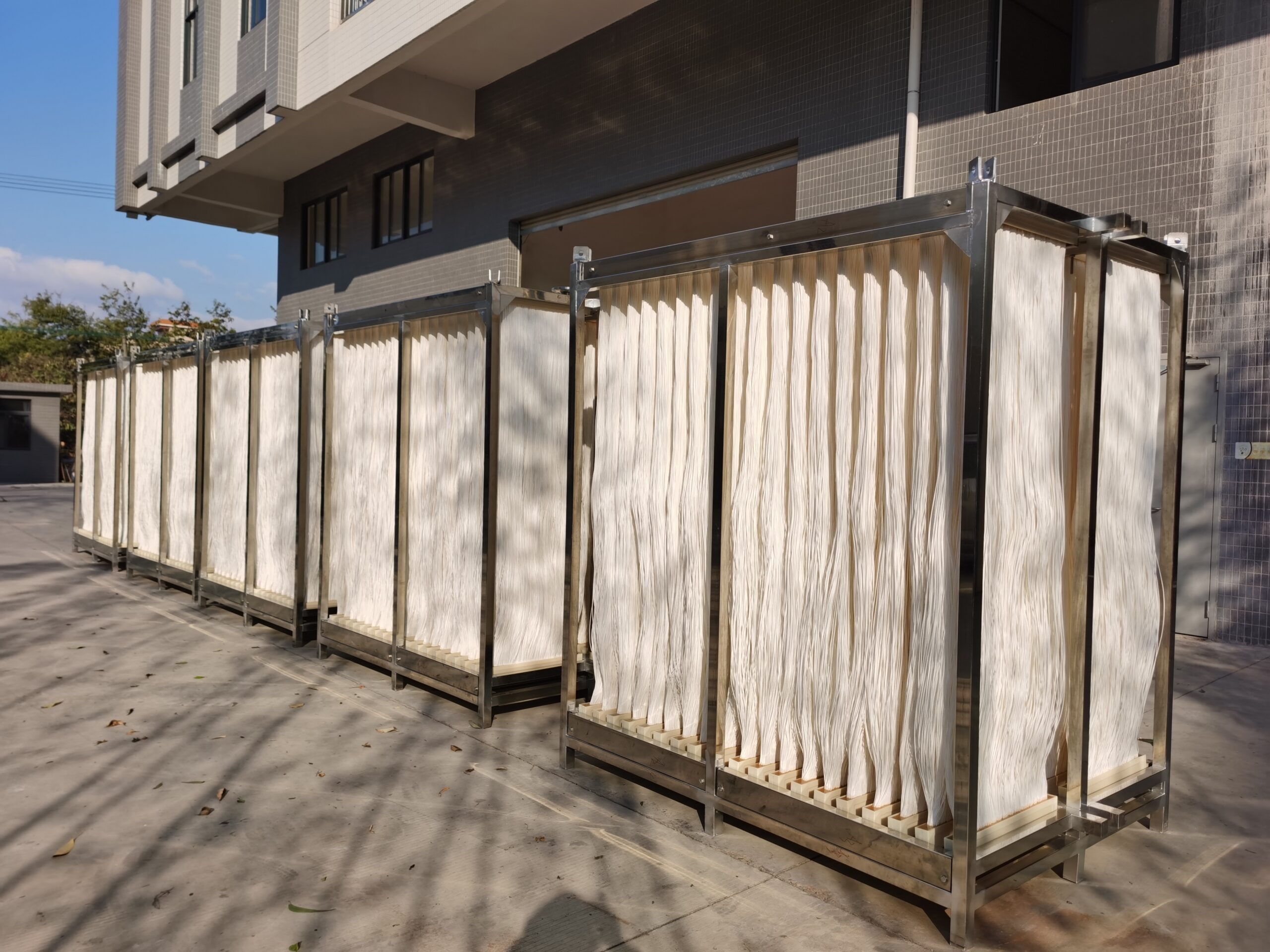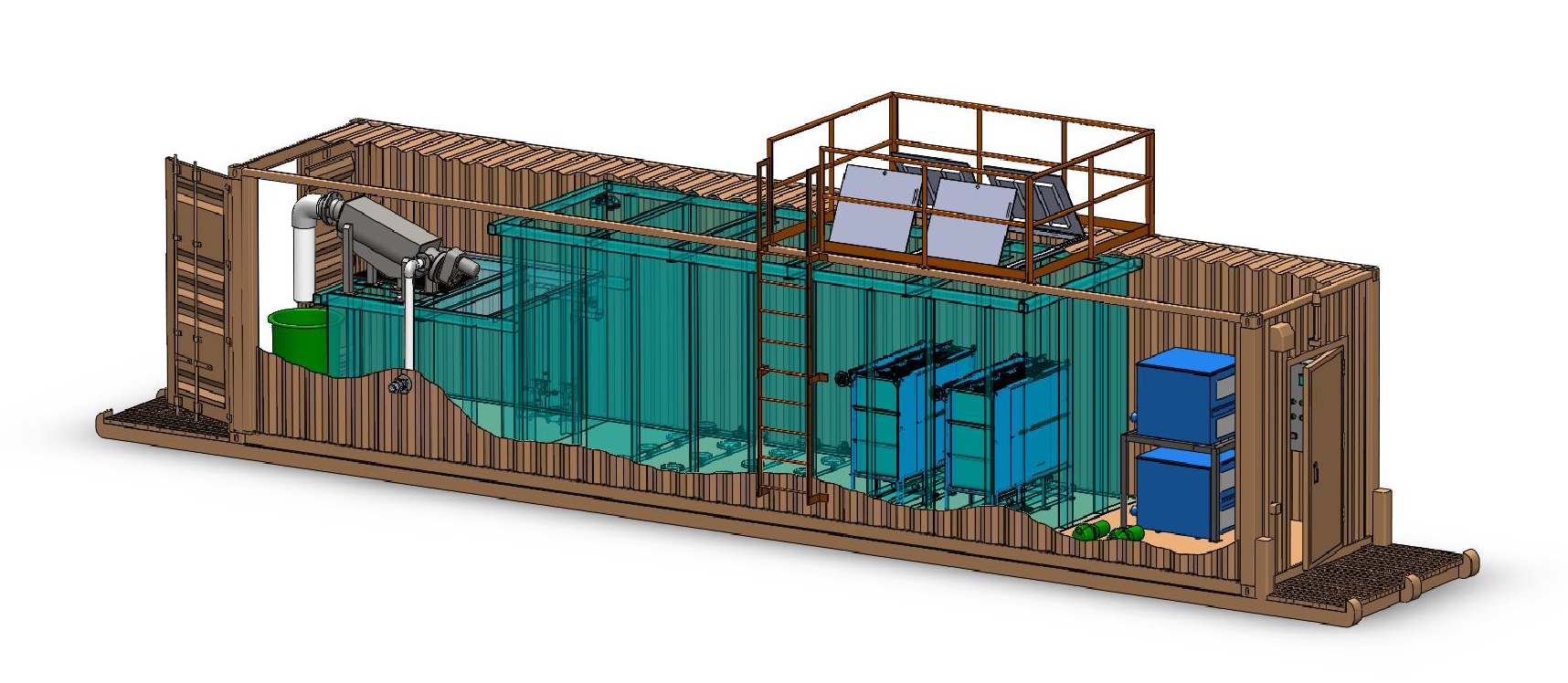The Advantages of Membrane Layer Bioreactors in Lasting Wastewater Management
Membrane bioreactors (MBRs) represent a pivotal development in sustainable wastewater administration, successfully merging biological treatment with advanced membrane filtration technology. This integration not only enhances effluent top quality by successfully getting rid of impurities yet additionally opens up opportunities for water reuse in various applications, thus addressing journalism demand for source preservation. The portable style of MBRs contributes to substantial decreases in environmental impact and functional expenses. As the demand for lasting remedies increases, checking out the multifaceted advantages of MBRs might reveal unanticipated effects for the future of wastewater treatment systems.
Review of Membrane Bioreactors
Membrane layer bioreactors (MBRs) represent a substantial improvement in wastewater therapy innovation, incorporating biological destruction with membrane filtering to enhance the effectiveness of the therapy process. This ingenious system combines the benefits of standard activated sludge processes with membrane layer technology, enabling for boosted solid-liquid separation. MBRs use semi-permeable membrane layers to separate cured water from biomass, resulting in top notch effluent that can be reused or safely released right into the environment.
The operational style of MBRs commonly involves a bioreactor where bacteria damage down natural matter, complied with by a membrane layer device that filterings system the mixed liquor. This setup not just decreases the footprint of the treatment facility however likewise permits greater biomass concentrations and reduced hydraulic retention times. Moreover, MBRs are qualified of dealing with a wider variety of contaminants, including virus and nutrients, making them suitable for various applications, from municipal wastewater therapy to industrial effluent processing.
The combination of MBRs into wastewater administration systems is a sign of a growing trend towards sustainable and reliable methods in environmental engineering. Their ability to produce high-quality effluent while minimizing space requirements placements MBR modern technology as a principal in contemporary wastewater treatment solutions.
Boosted Effluent Top Quality

The membrane purification procedure functions as a physical obstacle, making it possible for the retention of bacteria and particulate issue, which contributes to a clearer and cleaner effluent (Membrane Bioreactor). MBRs run at higher biomass focus than conventional turned on sludge systems, promoting extra effective biodegradation of toxins. This causes a decrease in biochemical oxygen demand (FIGURE) and overall put on hold solids (TSS) degrees in the last effluent
In addition, MBRs demonstrate excellent performance in dealing with difficult wastewater make-ups, such as industrial effluents and wastewater with high nutrient tons. As a result, the effluent created is typically of higher top quality, allowing for even more adaptable disposal options and minimized ecological impact. Inevitably, the enhanced effluent quality attained via MBR technology highlights its important function ahead of time sustainable wastewater administration methods.
Water Reuse Opportunities
The high-quality effluent produced by membrane bioreactors (MBRs) opens up considerable possibilities for water reuse in various applications. MBRs efficiently eliminate impurities, consisting of pathogens, suspended solids, and organic issue, causing cured water that fulfills or exceeds regulatory requirements for reuse. This high quality enables the execution of water reusing campaigns throughout varied sectors.
One prominent application is in farming, where dealt with wastewater can be made use of for watering, advertising lasting farming techniques while preserving fresh water sources. In addition, MBR-treated effluent can be made use of for commercial procedures such as air conditioning, cleansing, and as a procedure water source, dramatically lowering the about his need for safe and clean water in these procedures.
In metropolitan atmospheres, MBRs help with using reclaimed water for landscape irrigation, commode flushing, and various other non-potable usages, contributing to the overall resilience of supply of water systems. The combination of MBR innovation in decentralized systems aids in managing local water needs, particularly in water-scarce areas.
Lowered Environmental Impact
Just how can the fostering of membrane bioreactors (MBRs) add to a minimized environmental impact in wastewater monitoring? MBRs substantially enhance the therapy effectiveness of wastewater while reducing eco-friendly disruptions. By integrating organic treatment procedures with membrane purification, MBRs successfully remove a variety of toxins, including raw material, nutrients, and pathogens. This sophisticated purification causes higher-quality effluent, which is essential for protecting water communities and lowering the concern on all-natural water bodies.
Furthermore, MBRs operate at reduced hydraulic retention times compared to traditional systems, causing smaller treatment plant impacts. This portable design decreases land usage, thereby protecting all-natural environments and biodiversity. The procedure also produces much less sludge than typical methods, alleviating disposal challenges and lowering greenhouse gas exhausts related to browse this site sludge administration.
Furthermore, MBRs promote the recuperation of valuable resources, such as water and nutrients, adding to a circular economic situation. By enabling water reuse for irrigation or industrial processes, MBRs help ease freshwater deficiency, hence advertising lasting water make use of practices. Ultimately, the adoption of MBR technology represents a significant stride towards reducing the environmental impact of wastewater administration systems.
Economic Advantages of MBRs

Additionally, MBRs facilitate the manufacturing of high-quality effluent, which can be recycled for numerous applications, such as farming irrigation and industrial processes - Membrane Bioreactor. This reuse capacity can dramatically lower water procurement costs, providing a financial motivation for markets dealing with stringent water regulations
The portable style of MBR systems also results in lowered land demands, which is especially valuable in city areas where real estate is pricey. By decreasing area, markets and towns can minimize land purchase and maintenance expenditures.
Furthermore, MBRs often call for less constant maintenance and have a longer lifespan than standard systems, further adding to cost financial savings. In summary, the financial advantages of MBRs-- varying from reduced functional costs to land financial savings and effluent reuse-- make them a compelling selection for sustainable wastewater management, supplying both long-term and prompt financial advantages.
Verdict
Membrane layer bioreactors stand for a transformative method to lasting wastewater monitoring, combining biological treatment with innovative membrane layer filtration for exceptional effluent top quality. Their ability for effective contaminant removal assists in water reuse, therefore conserving important freshwater resources. Furthermore, MBRs add to lowered ecological impacts via small designs and reduced sludge generation. Economic benefits better improve their viability, making MBRs an encouraging service for addressing the difficulties of wastewater treatment and advertising lasting source administration.
Membrane bioreactors (MBRs) represent an essential improvement in sustainable wastewater management, successfully merging organic treatment with innovative membrane layer purification modern technology.Membrane layer bioreactors (MBRs) represent a considerable advancement in wastewater treatment technology, incorporating organic degradation with membrane filtering to improve the efficiency of the treatment process.Achieving improved effluent top quality is one of the most significant advantages of utilizing membrane bioreactors (MBRs) check it out in wastewater therapy.In addition, MBRs show exceptional performance in treating tough wastewater compositions, such as commercial effluents and wastewater with high nutrient loads.Integrating membrane bioreactors (MBRs) right into wastewater management not only decreases environmental effect but also provides substantial financial advantages.
Comments on “The Advantages of Using a Membrane Bioreactor for Efficient Water Purification”